#i lied it got long
Explore tagged Tumblr posts
Text








END OF CHAPTER ONE
FORGETTABLE-AU (Page 65-72)
* Time to put this puzzle together.
[BEGINNING] [PREVIOUS] [CONTINUE]
#long post#SO SORRY FOR THE POST BEING SO LONG BUT I NEEDED THE DRAMA AND YOU GUYS BEING LIKE#“why is it still going.....”#hehe#JOKES ON YOU! I LIED! THESE ARE 8 PAGES NOT 6!!!#yippiee#YOU GOT EVEN MORE#OKAY NOW#To address everything!!!#“time travel? Really?”#YES REALLY#HAVE YOU ALL SEEN WHAT SANS SAYS IN HIS BATTLE#“our reports” “timelines jumping left and right” “an anomaly in the time-space continuum” HE KNOWS ABOUT THAT STUFF#HE RESEARCHED THAT STUFF#HE HAS A SECRET CODEWORD READY IN CASE HE FINDS A TIME TRAVELER WHY WOULD HE HAVE THAT???#Alphys has researched alternate universes too(which are usually related to alternate timelines)#okay enough of me rambling#I told u guys I made a mess to make the undertale timeline make sense lol#ANYWAYYSS#SIGH finally done with chapter one#IT WAS 52 PAGES LONG!!!!#So many things happened here#PAPYRUS AND FLOWEY ARE BACK!!!!#see you all again soon with chapter TWO#forgettable-au#forgettable-au-comic#papyrus#papyrus is gaster#undertale#gaster
2K notes
·
View notes
Text

——————
it’s been 6 years exactly nd i apologize for everything about this
[tw: implied csa]


























#i did not work on this fr 6 yrs obvio i jst hated what i did originally nd dropped it forever#bt like last month i thought abt it again nd realized that 6 year promise was coming up….so i debased myself#i still hate this so much :) but i forced myself to do it#rip to the 100 odd ppl who were xcited abt this when i originally posted the sneak peek#i rly wanted to try making something long but i think i shdnt do that n e more lmfaoo#thers a significant quality drop on lots of pages i never quite got around to finalizing n time. sorry. sorry sorry sorryyy#iasip#always sunny#charlie kelly#dennis reynolds#mac mcdonald#mac macdonald#charden#chardennis#trash trio#charmacden#deetress if u squint#fanart#mine#i want to xplore the chardeetress part of their hs more i rly lov that trio#also also i totally lied in the original post talking abt ‘these 3 suffering’ it was always focused on the charden trauma connection#sorry mac girlies#i hav complex feelings regarding mac's involvement n th uncle jack side of charlie's childhood#but they r not on display here#gnna hav to draw some cute bb charmac to repent and to self sooth aftr this#1k
1K notes
·
View notes
Text
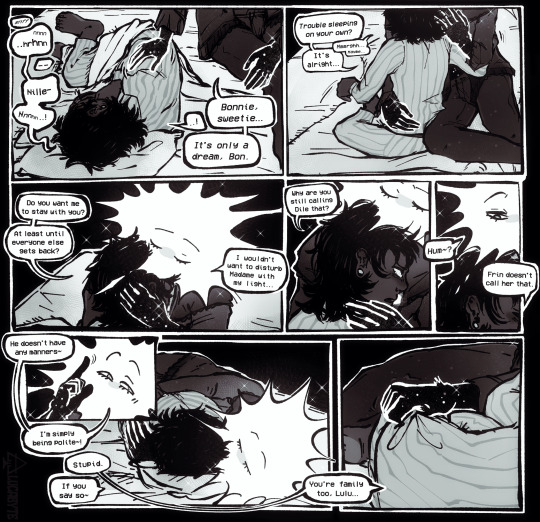
Different standards
#didnt mean to do this one in quote unquote colour but it wasnt legible without it so. heres a treat i suppose#isat#isat spoilers#in stars and time#in stars and time fanart#isat fanart#isat loop#isat bonnie#lucabyteart#coughs up a lung. anyway. ramble time as per usual. this is what i was warming up for btw in case it wasnt obvious#besides being another entry in the 'letting bonnie read loop for filth on accident' series. this is mostly self indulgent musings on#headcanons (and i will just use that word here.) ive previously rambled about in other tags and posts#namely: in the scenario that loop integrates into the party as a New Person for quite a while before The Truth Come Out. i feel they have#a decent chance at really scoring a slam dunk in becoming a guardian figure for bonnie? loop's demeanor is already colder and a tiny#bit more level-headed than siffrin's in the way they seem to discuss bonnie with them. namely pointing out that bonnie#never really hated them. it seems to be one thing they're genuinely at peace with? they've seen by now the truth that bonnie#was just scared and upset. and likely now knows that what bonnie wants is to be treated with grown-up respect within reason. plus loop#already scores bonus points with bonnie since they didnt 1. fuck up bad like sif did in act 5 and 2. saved sif in the party's eyes#... but then when it turns out that this clean-slate relationship with a stranger was siffrin being deceitful? must have been odd.#bonnie seems to really dislike being lied to. the question is whether they'd see it that way? would they feel betrayed there?#anyway. this is set after all those emotions are at least settled some. loop able to be more physically affectionate... and yet#still not letting themselves be quite as close as they'd like perhaps. perhaps...#anyway translucent pyjamas because i dont care if you're comforting a crying child you've GOT to SERVE!!!#and also i feel like the party probably wouldn't let loop stay completely naked for that long. especially not post-reveal anyway
1K notes
·
View notes
Text
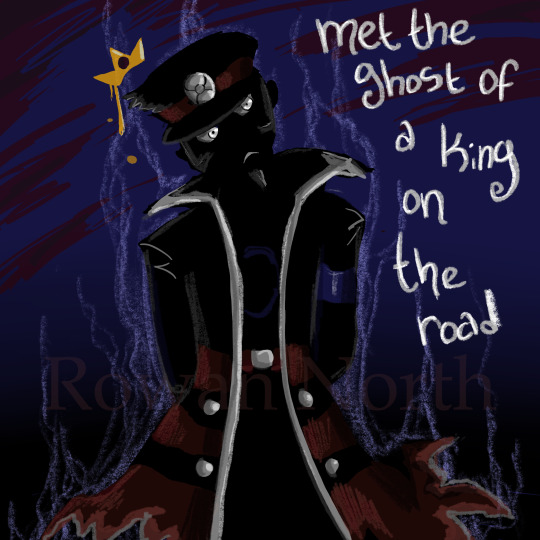

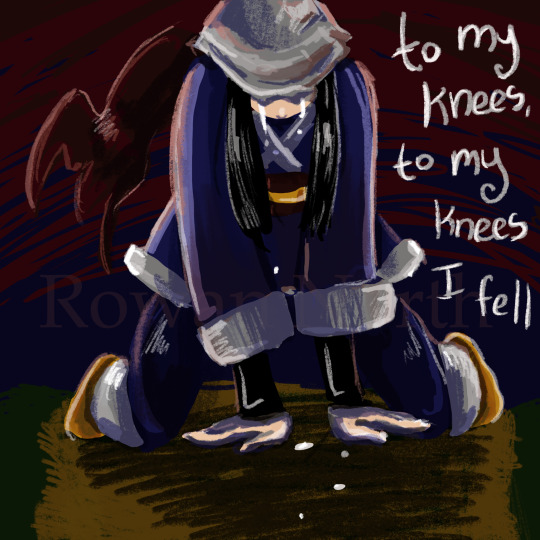



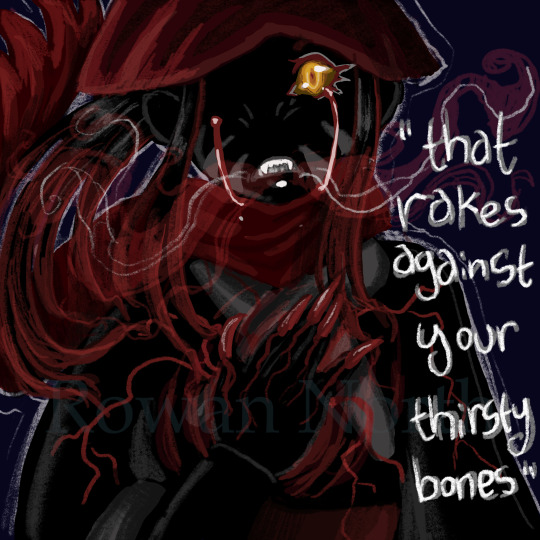

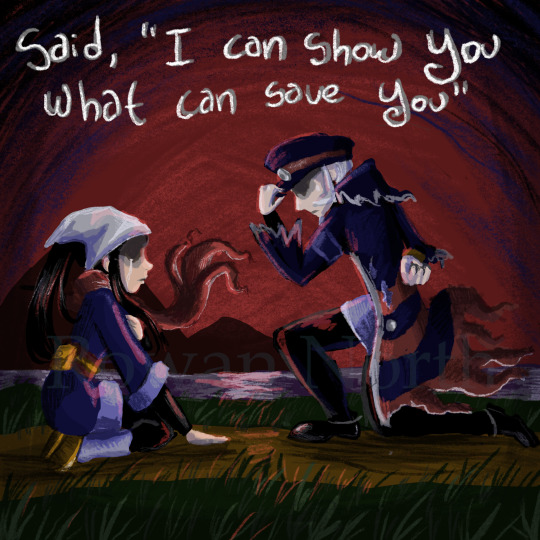


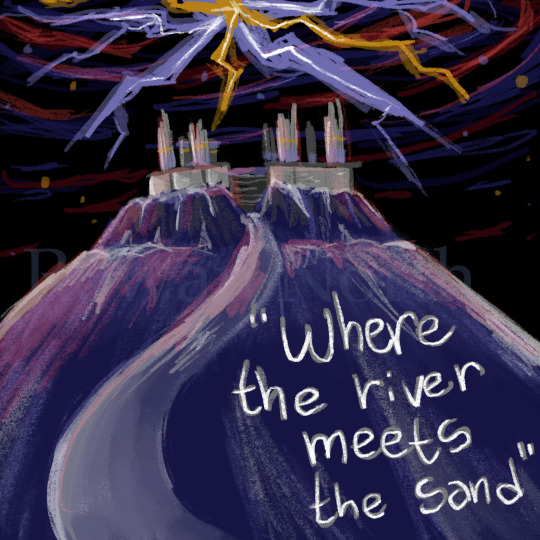


youtube
EDIT: I was missing a panel!! Orz Now the whole thing is there It's done!! GOOD HEAVENS this was an undertaking with a bunch of going back and editing drawings to be more cohesive!! But I am so glad to finally have it done, for Pokemon day! This all was inspired by a few AUs I've seen by people such as @waywardstation and @parasolladyansy , as well as an AU RP I did with a friend where humans who were Deeply Wronged became the wrathful Hisuian Zoroark (With her Akari nearly becoming one herself) I totally have more drawings I thought of for the whole song, ("But the voice of the ghost was coming from a ghost no more" being Emmet, having a side by side with Emmet going on a journey looking for Ingo and comparing his journey to Akari's) but it was already like, 14 drawings and I wanted to tell a cohesive story without burning out instead;; Happy Pokemon Day!!
#Long post#pokemon: legends arceus#P:LA#Pokemon#Pokemon day#Submas#Ingo#Warden Ingo#Akari#Pokemon Akari#Volo#Pokemon volo#Dialga#Palkia#Arceus#Pokemon fanart#Pokemon Day 2025#I'm sorry it took so long but life happens and I got distracted#Things like crafting christmas presents#And preparing for a baby#Fun life stuff lol#Also I said there was 12 drawings#I lied#I'm bad at counting
400 notes
·
View notes
Text

the comfortable warmth of a beating heart

close up...
#llemon art#lies of p#lies of p fanart#lies of p pinocchio#they cannot stop me from drawing his hair in his face#the colors got out of hand in this one#nothing will ever replicate the moment i got the#'your heart is pounding'#im so strong for drawing the bluebloods tailcoat instead of the white shirt#first time coloring in a little while#the background also wasnt supoosed to be.#massive but well.#i had too much fun coloring#i like his white hair#i like his long hair in general actually#let him be free!!! let him have his identity!!!
245 notes
·
View notes
Text
Kiyi is not a Princess - A Look At the Fire Nation's Line of Succession
It's not even that much about Kiyi. But the creators seemingly got so lost in the sauce that their ideas about how absolutist monarchies work are as good as taken out of Disney movies now. So, let's set the record straight.
The Fire Nation line of succession
When it comes to royal lines, there were multiple elements that went into setting the line of succession: descent, sex, legitimacy, religion etc. For the Fire Nation, the ones we have 100% confirmed are descent and legitimacy (this last one seen with the Camellia-Peony War, where Chaejin was excluded from the succession because he was born out of wedlock). I would have gone on a whim to say sex counts as well, however, it is a bit foggy. In the Reckoning of Roku, it is mentioned that Firelord Taiso believed Zeisan (Sozin's younger sister) would have been a more competent ruler but could never become Fire Lord due to being a nonbender (I didn't actually read the book, so if someone who did wants to pitch in with the exact wording, please feel free to). This implies that being a Firebender is a requirement, but being a woman isn't. However, it also implies that Taiso would have been fine with ignoring the descent part (Sozin was older) if he deemed fit. Skipping the firstborn in favour of the second one isn't unheard of when it comes to succession so sure. And he is the absolute monarch, if he wants to pass papers to change the line of succession, he can. It is unclear to me if there is any power in place to veto or block a Fire Lord's ruling on any matter so for all we know, if he wanted, he could have. Plus, the fact that Ozai got crowned over Iroh because it was 'Azulon's dying wish'. For the religion part, it seems like the Fire Sages have to perform the coronation and acknowledge the monarch.
So to make it more digestible, the line of succession (while Azulon was still alive) is: Iroh → Lu Ten (firstborn of the heir) → Ozai → Zuko → Azula. With Lu Ten dead, Iroh MIA (at the time) then we have Ozai → Zuko → Azula. When Iroh came back, he gets added at the end of this line of succession. I am a bit unclear on Iroh in current times because it looks to me like he rescinded his role in the line of succession altogether with deciding to live in Ba Sing Se and letting politically inexperienced Zuko rule instead of taking over for a few years to create some stability.
Right now, we have Fire Lord Zuko and his heir presumptive (aka an heir that can be displaced if the monarch has children) Azula. Unless he wrote a decree to take her out of the line of succession — which would require a lot more brain cells than the writers are willing to give Zuko, not that he had a lot of them when it came to politics to begin with —then she's next in line. It doesn't matter how much anyone wants it or not, if Zuko drops dead tomorrow, Azula gets the throne.
Now, onto the other matter.
How does one become a Princess?
Option 1: You marry into the royal family. For example, Ursa was styled as a Princess, as she married Prince Ozai.
Option 2: You're born in a royal line. For example, Azula is a Princess because her father is a Prince, her grandfather, at the time of her birth, was the ruling monarch of the Fire Nation etc.
Bonus Option it's complicated: Royals had a habit of having children out of wedlock sometimes. Said children, if acknowledged, could be granted titles (Count of X, Dutchess of Y etc.) . Getting acknowledged and a title does not automatically put you in the line of succession, though. For example, Firelord Chaeryu was forced to acknowledge Chaejin and avoid dishonoring his noble mother and her house, but he excluded Chaejin from the royal family.
So Kiyi is not a Princess. Simple as that. Neither of her parents are of the royal line.
Could she become a Princess?
Well, this gets interesting.
Let's start with the fact that Kiyi got a pretty bad deal in a class-based monarchical society.
First thing, while her mother is a noble, her father is a commoner. Even if Ursa's family became destitute after Roku's death because of political reasons, it does not change the fact that she is still nobility unless Sozin revoked Rina's title, which I am not 100% sure he did. We don't know anything about Jinzuk besides the fact that he was the magistrate of Hira'a. While magistrates do not have to be part of the nobility, they can be. He could have been a second/third/fourth son of a small noble family with limited power/resources, given the position he was given was in a place like Hira'a, which is what I am inclining towards. He could have also been just some guy, but someone appointed him, and as a rule of thumb, you don't just go into the street and pick a random person to appoint to an administrative and leadership role, even if it's a small town. Given that Azulon was set on Ozai marrying Ursa because she was Roku's granddaughter, whether or not Jinzuk was a noble, it doesn't matter all that much in the grand scheme of things. However, in Kiyi's case, it does if Zuko wants to give her a title. It's more stigma than anything because people can be given nobility titles for specific services to the crown etc. But this is not her only issue. Which leads me to...
Second thing, Kiyi is a bastard. Which, in my opinion, would hold even more stigma than her father not being a noble. Ursa never divorced Ozai. As far as we know, polygamist marriages aren't a thing in the Fire Nation, so her marriage to Ikem/Noren is invalid. Could she be granted a divorce retroactively by the Fire Sages? Actually, yeah. Because Zuko named Shyu as High Sage, which was like the one sound political move he ever did tbh. We don't see what the Fire Nation's stance on divorce is, but given that Shyu is a Zuko loyalist, he'd probably grant Ursa retroactive divorce from Ozai. I am not a legal expert, however, as far as I know, retroactive decisions tend to be reserved for correcting a mistake or omission in the written record. She was still married to Ozai when she went and married Ikem. Though technically, she married him under a fake identity (and so did he), which might make the marriage void regardless in the eyes of the law. Idk how Spirit involvement affects legal matters in the world of Avatar, but as things stand right now, unless we pretzel-twist ourselves to make excuses, Kiyi is born outside of legitimate wedlock.
Now, Zuko might not care. In fact, he probably doesn't. He could still give Kiyi a title, including that of Princess. It was not uncommon for illegitimate relatives of rulers to be offered roles/titles once acknowledged. The real question is if he would put her in the line of succession. Kiyi has no business being there because she does not have royal blood.
Could Zuko do whatever he wants, give her the title of Princess and shove her in the line of succession while taking Azula out of it for good measure? Sure, he can. He'd probably love that, in fact. But that leaves two things open.
One, nobility would not take kindly to a bastard child of a commoner with no royal blood being in the line of succession. If we also add the angle of taking Azula out of it, it would just increase their ire. There is already a long list of why the nobility is probably angry at Zuko (and should attempt to assassinate him a lot more than they do), but I think this one in particular has other implications. There might be nobles who are neutral about Zuko. Shamelessly discarding societal norms on a whim might make their perspective swing towards negative. It could make him lose goodwill he might have or potential allies.
Two, it will make the commoners wonder. If this random girl, raised as a peasant, with a commoner father, born out of wedlock, can be put in the line of succession just like that — while discarding a princess of the blood if we are at it — then… is the royal line not that special? The whole premise of a monarchy is that the monarch and their descendants have the divine right to rule. Being part of that bloodline gives you the right to rule. So if that can be discarded, if that bloodline is not all that important… should Zuko be Firelord? And most importantly, does the Fire Nation really need a monarch at all?
Kiyi is not a princess, and for the well-being of Zuko's reign — which is already barely holding together — he better not make her one.
#kiyi#atla#atla meta#fire nation#azula#zuko#(tbh the easiest way to pull this is Ursa pretending she was pregnant with Kiyi when she left and she's Ozai's kid)#(that requires her to retain some sharpness from her show appearance instead of being the blandest soggiest piece of character cliche)#(so not happening)#(also you'd have to be a moron to actually buy that but there's no DNA testing so)#the comics really are wasted opportunity after wasted opportunity huh#like this is the source material that gave us Long Feng the the Dai Li plot in Ba Sing Se#and we could have such interesting political intrigues in post war FN#but no#what we do is go actually everyone was good all along#all the characters that matter have always been anti imperialist#indoctrination doesn't exit#fire lord azulon who ruled for like 70+ years?#don't know him#can I see how Zuko brought the Fire Nation from it's war self to the peaceful and prosperous country in LoK?#Ah yes through the power of retconning#my bad for having standards#I mean I also have beef with the way some people in the fandom have no understanding of how monarchies work#but that's expected#what's the writers' excuse?#okay I'll shut up now this got out of hand
167 notes
·
View notes
Text
Oh no he’s fuzzy
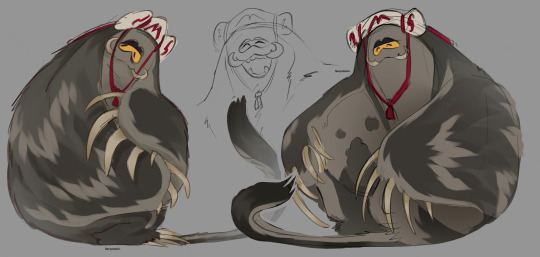
#and he’ll cuddle#and rip flesh apart too#art#fanart#my art#original art#Splatoon#Splatoon 3#Splatoon fanart#splatoon art#Splatoon fan art#Splatoon big man#big man Splatoon#big man#big man fanart#splatoon big man fanart#mantaro#apparently I lied. yes I will continue posting because if I’m being honest it’s what I do all the time. not even my homework#and while I am still busy working on commissions even if it doesn’t look like because of how long I take- I still have like#nighttime and some breaks to still draw stuff to post. and yeah I mean I draw quickly when I’ve got good ideas#man I really have to stop procrastinating so bad#Splatoon fuzzy au#Splatoon au#fuzzy au#comfort au#original au#just now I realize I didn’t tag the Frye post with the fuzzy au smh
758 notes
·
View notes
Text



"Are you crazy? Why did you forcibly suspend your cultivation and bring about your own destruction?"
FANGS OF FORTUNE (2024). EPISODE THIRTY TWO.
#fangs of fortune#asiandramasource#dramasource#cdramasource#tvedit#*#faiza gifs#honestly he's IN THERE in top 5 characters OF THE YEAR for me. WHAT A BEAUTIFUL HAUNTED SIMPLE BUT COMPLICATED FULL OF RESENTMENT#YET SO MUCH LOVE BUT DOESNT KNOW WHAT TO DO OR HOW TO USE IT bisexual.#he is EVERYTHING i want. yanan you STAR. you STAAAAAAAAAAAAAR.#like li lun is RIGHT UP THERE with xue yang as one of those characters that just. leave the DEEPEST of impressions on you. even long after#the show's finished. their story is just THAT compelling. THEIR CHEMISTRY WITH EVERYONE is just THAT sizzling.#anyway. all this is to say that im just SO happy with li lun's entire character arc and story.#like i KNEW he was gonna die anyway and id made peace with so long ago that it just FELT like.#im just so HAPPY that like. HE got to choose HOW and WHEN he'd die. on his OWN terms.#and thats ALL he's ever longed for. SOME form of freedom. and he GOT THAT.
155 notes
·
View notes
Text
POV: the human tupperware you put your son's soul in is being a little shit

#Lies of P#tried to screenshot P's look of ''Fuck Off Dad''#pressed F12 one second too late and got this amazing look of utter DipsapointmentTM#anyway#i'm going to bed#Nameless is super fun to fight tho like holy shit???#i've been wanting to fight him for so long#bro's gotta tone it down with the particle effects in his phase 2 tho i can't see shit
125 notes
·
View notes
Text

It's my annual redraw! Big year for me, season 2 ended, and with it the manga, but I've got lots of screenshots to make with your requests, so you can all still count on me to be making content for these teens in 2025!
Happy new year from Dungeons and Daddies the anime!
#dndads#dungeons and daddies#doodly#taylor swift dndads#lincoln li wilson#scary marlowe#normal oak#my art felt really stagnant for a long while#this year#before finally something clicked when I started dragon ball#and now I've got this style going on#which I'm really excited to play with in the new year!#many screenshots to work on
77 notes
·
View notes
Text
there's something so odd yet fascinating about how fanworks for mxtx's books tend to misinterpret the literal protagonists of her stories more than any other characters
#keri chats#mxtx#scum villain's self saving system#mo dao zu shi#tian guan ci fu#my extremely watered down hypothesis: it's the Yaoi Bottom Protagonist Effect#fans often hit shen qingqiu with the Isekai Transmigrator Identity Crisis beam or Returnee Angst beam#but he canonically doesn't think of himself as “shen yuan” or yearn for his og family even once across the years he's been in PIDW verse#he likes where he is now & is kinder n friendlier w his peak lord peers than ppl realize. it's not a ruse or acting. he's really like that!#wei wuxian... i could fit 50 essays on him alone tbh i've talked abt him in other posts & mostly blame c/q/l for the characterization hell#xie lian objectively got hit hardest by the yaoi sub fanon beam LMAO he's inexperienced w romance and sex but not... not like that#xie lian is a lying liar who lies. he tricks and mocks people. pretends not to know things. a smart weapon-loving martial god#xie lian doesn't easily share his thoughts even with the reader bc of how badly he's been hurt. but he sees all the signs of love#and he knows what he desires. he just takes a very very long time to feel comfortable acting on it#mdzs#tgcf#svsss#danmei
108 notes
·
View notes
Text
ok. look at these.
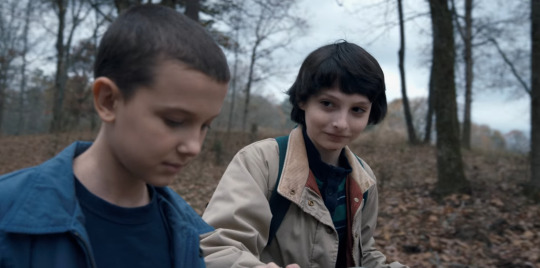

look. that's the same look. right?
let's take a closer look. to do that, i'm gonna have to zoom in a bit on the first one. because, as you can immediately see, the shots are slightly different. the first is a little farther away, showing both mike and el, walking next to each other, whereas the second is much more intimate, a closeup on mike's expression as he looks at will's face in the foreground. a minor but telling difference about the levels of emotional intimacy in each scene.
so, moving past that first element of contrast, let's look at each shot in full, because in both of these scenes, mike goes on a bit of a face journey before he gets to that final smiling expression, seen above.

personally, i think studying actors' body language and micro-expressions is inconclusive at best, but i won't deny that these look similar. however, it's pretty clear to me that they aren't the same.
toward el, i see confusion, intrigue, maybe pleasant surprise, followed by a glance down (to emotionally process and/or watch his step), and then a nervous but friendly smile.

toward will, i see awe, relief, and overwhelming affection, followed by a shy glance down and a slight schooling of his slack jawed expression into a warm smile.

but, again, that's just my interpretation, and i can't say with any certainty what the intention of all of finn's micro-expressions are. but from my perspective, even a surface level viewing of these two expressions depicts a very different emotional experience. however: there's no denying the connection between these two scenes. they clearly mirror each other, just like a lot of things about mike's relationships with el and will mirror each other. i don't think that's an accident.
whatever you think his sexuality is, mike is undeniably in a romantic narrative with el. beginning in season one episode three, when the concept of their romantic relationship is introduced, the narrative arc mike and el share is heavily focused on that relationship. the first scene above actually happens in that same episode (s1e3), not coincidentally almost directly afterward. and the former scene, with mike, lucas, and dustin behind the baseball field, provides very interesting context for several reasons:
first: bear with me, because we're going back to look at the context behind this context. this is only episode three of the show, but already there's a lot going on, both in text and subtext.

and since we have the entirety of their relationship so far presented to us on screen, when lucas accuses mike of looking at el romantically, we're easily able to go back and figure out where he got that impression: we can examine every time lucas has seen mike look at el at all.
the first night, after finding el in the woods instead of will, and while insisting that the next day she'd be gone and they could focus on will again, mike's behavior is directly reminiscent of benny's. taking el in, and providing her with shelter, food, and clothing.
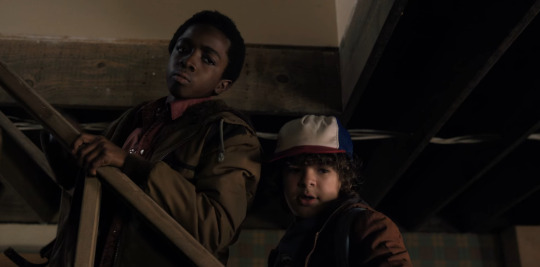
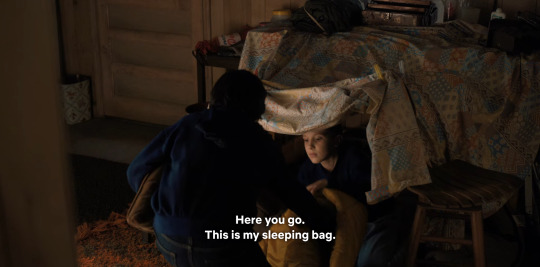
the next day, after learning that she's in danger and changing his mind about pawning her off on his mother, mike infers that she might know something about will. when lucas arrives, he exclaims that she recognized him and knew he was missing.
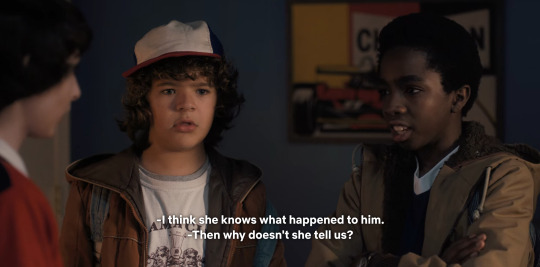
later, when lucas tells her that will is their friend, she asks what that means and mike explains. a friend...
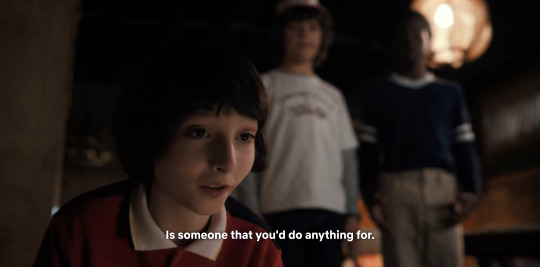
and then she displays that she might really be able to help them find will. and mike looks at her like this:
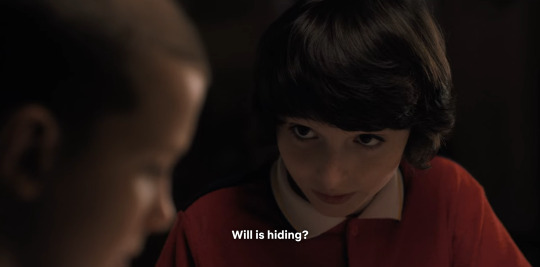
each and every one of these interactions is directly related to will. but lucas, through the omnipresent lens of heteronormativity that surrounds boys' interactions with girls (especially a group of boys who have no experience with girls... more on that in a bit), only seems to consider the fact that mike's behavior, which is undeniably about will, is being directed at el.
throughout season one (and beyond, in more subtle ways), will and el are repeatedly connected to each other through the trope of mistaken identity. will is abducted on the same night (and due to the same series of events) that el escapes the lab. hopper, in his investigation into will's disappearance, keeps running into clues about el. and mike, lucas, and dustin, sneaking out in episode one to search for will, find el instead.
later in the season, hopper eventually realizes the truth of his own more overt mistaken identity arc: while he was under the assumption that he'd been following will's trail, he'd actually been following el's. interestingly, the realization is triggered by one specific distinguishing difference, which tells him beyond a doubt that he's been looking for two different kids: their art.
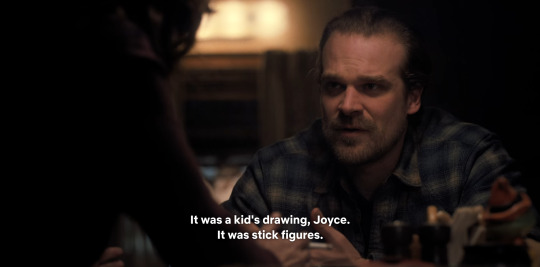
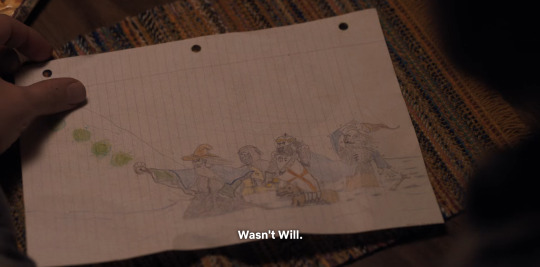
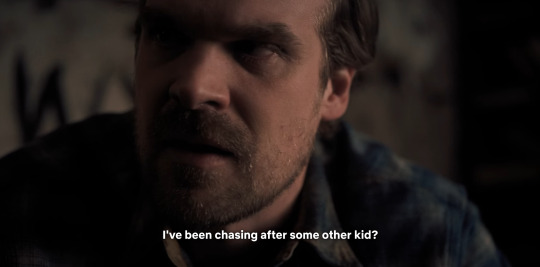
though much more subtle (aka hidden in the subtext), mike's arc with his feelings about will and el follows a very similar pattern. the main difference, though, is that in season one, the swapping of places is eventually reversed but never acknowledged as such, and mike ends season one with el now missing and will back in his life, but a lingering sense of something yet unresolved.
second: (i'm not going to deep dive into this one here, because it's a whole analysis in and of itself, but i need to mention it because it is relevant) this scene introduces the recurring motif of superheroes being directly connected to mike's feelings for el, which is an association we see follow them all the way into season four and become a defining metaphor for their incompatibility.

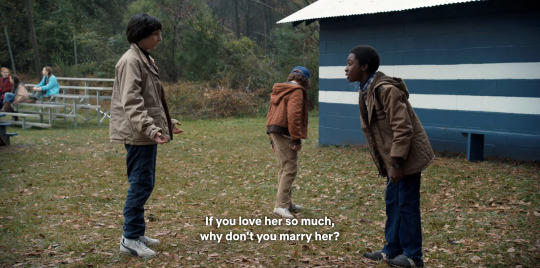
third: lucas is the character who first introduces mike's romantic feelings for el into the narrative. and instead of giving any indication that lucas' interpretation is correct, mike's reaction is... difficult to read. his response is immediately defensive, both verbally ("what are you talking about?" "shut up, lucas,") and physically (leaning away and shielding himself when lucas hugs him). we can infer from the original character descriptions why mike might be defensive about this subject:

obviously, this description is only a vague impression of what Mike Wheeler became, but it's clear that the core elements of his character outlined here did come to fruition on screen. here, mike's insecurity is linked both to the bullying he undergoes, and to his inexperience/ineptitude with girls. and it's presented as key to his character motivation (the original concept of his character arc put forth here is very straightforward: at the start, mike has insecurity centered around bullying and is romantically inexperienced. by the end, mike has courage against monsters and romantic experience.)
in any case, this scene is the first hint of this aspect of mike's character in the show itself (the earlier scene of bullying in the show focusing on mike consoling dustin over what he’s being bullied for (“i think it's kinda cool. it’s like you have superpowers or something!”)... see my last point here… mike holds the idea of superpowers in high regard, and they are consistently connected with his feelings about el. something about the mistaken identity through-line feels apt here: mike mistakes his feelings of admiration for el as feelings of romance.) in this scene, mike is confronted with both romance (in direct relation to himself for the first time in the show) and bullying.
but due to the way this is shot, it's impossible to get a read on what mike is truly feeling. it reminds me a lot of another scene, actually...

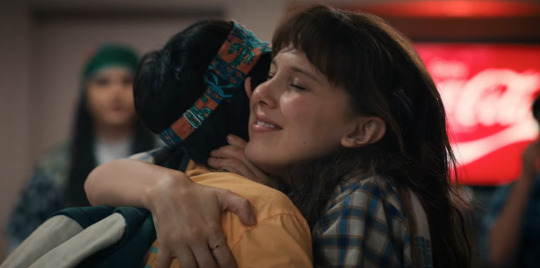
in both of these scenes, mike's genuine emotional reaction is hidden from us. in the first, lucas forcibly hugs him, teasing him about how much he "loves" el, and in effect introducing the idea of el as a romantic prospect to mike. in the second, el hugs mike tightly, her hand still around his neck from their kiss and his arm trapped in between them, similar to the way he shields himself from lucas. we're then shown that he's signed the card on the flowers squished between them "from, mike." hm. so... not love, as lucas suggests.
we come to learn over the course of season four that this is something mike is actively struggling with: his inability to "love" el in the way that she wants, expects, and deserves. this scene, introducing that season-long arc, conceals mike's true emotional state and motivations from us, again, mirroring the first introduction to their entire romantic plot line way back in season one.
(an aside: lucas' "if you love her so much, [then] why don't you marry her?" aka the inciting event of their romantic arc, is a based on a conditional statement with the hypothesis that mike loves el. as mr. clarke might posit (in, say, season one, episode one): what's the difference between an experiment and other forms of science investigation? ...well, an experiment is a controlled test of two or more variables against a hypothesis. does that remind you of anything happening in mike's romantic narrative? something about...... [murray voice] experimenting sexually?)
anyway. then, after extracting himself from el's embrace, mike finally drops his bag(gage) and opens his now empty arms to will, before preemptively cutting himself short with a punch to the shoulder.
...did someone say internalized homophobia?
and then immediately upon being introduced to argyle, mike is called out for his presentation here not being genuine. ("it's a shitty knock-off,"/"i really thought it was ocean pacific...") we're being told that something about mike's performance is not what it seems (and may even be a case of one thing being mistaken for something else).
and speaking of homophobia...
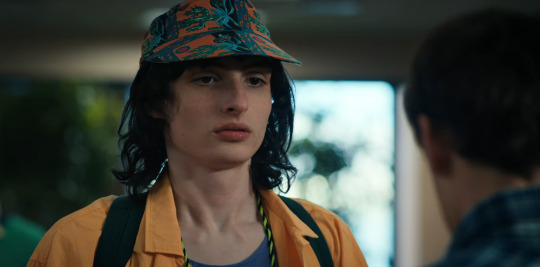
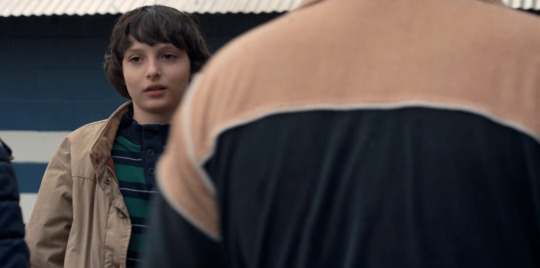
fourth (and finally): this scene, of lucas' teasing mike about his "love" for el, which i'll remind you again is tied directly to lucas mistaking mike's behavior regarding will as being solely about el, is quickly interrupted by an onslaught of homophobia, during which mike is specifically targeted (read: tripped) by the bullies.
the juxtaposition is immediate and obvious: mike's friends lovingly teasing him, even embracing him, over a crush on a girl vs. bullies maliciously taunting them about will being killed for being queer and then physically harming mike.
(there's also something to be said about the later scene in which these bullies force mike to drop his bike in the woods and chase him to the edge of the quarry, mirroring exactly how the cops assume will must have died... and, to be clear, i'm not saying that mike himself is being bullied for being queer in the way will was. no, mike's queerness is invisible to those around him in a way that will's isn't, so his relationship with it and the ways it affects him are hidden in subtext.)
which brings us directly to the following scene in the woods. el asks about mike's injury (sustained from the aforementioned bullying, thereby linking these two scenes even more concretely) and with a little prodding ("friends don't lie"), he opens up to her about what happened, and about being bullied at school. she listens, tells him she understands (this also follows her recent flashback of brenner's abuse in the lab), and they share a "cool," "cool," and a smile.
so... let's quickly jump over from here to the van scene with will. something similar, yet notably different, is happening in this scene, leading up to that infamous smile at the end. mike is sharing his insecurities with will now, but instead of will prodding him to open up, mike, prompted only by will's "she's gonna be okay," begins rambling so much about his insecurities (while speaking in superhero metaphors) that he eventually cuts himself off, saying it's "stupid." instead of letting him brush it off, will guesses exactly what mike is afraid of: "you're scared of losing her." he gives him The Painting (a symbol of his love for mike) and a long speech about feeling lost and different, while insisting upon mike's value (you're the heart, leading us, inspiring us, etc). and then they share a "yeah?" "yeah," and a smile.
so we can see the similarity in the way the shots are set up, the progression of the conversations, and mike's visible reactions. but we can also see distinct differences, all of which together inform a significant difference in emotional weight between these two scenes.
while mike's conversation in the woods with el takes place in the third episode of season one, at which point mike has known her for less than 48 hours, the van scene is in the second to last episode of season four, and is the fourth of five heart-to-hearts mike and will have this season alone (and following three previous seasons and beyond that years of close friendship). it is also arguably the climax of their shared arc this season. on the other hand, mike and el's season one moment is part of the introduction to their storyline, and the introduction to their romantic arc. in this moment in the woods, mike is looking at el romantically (did you think i was gonna argue that he isn't? because no, he definitely is). in fact, this is the beginning of mike's entire romantic arc, which sets out to address the foundational insecurity that is key to his character. we, as an audience, right alongside mike, have just been told (by lucas) that mike has romantic feelings for el. and then we are presented with this scene. we are supposed to view this as romantic. because mike is starting to view it as romantic.
had stranger things been one season long, then the climax of their romantic arc would have been the kiss they share in the cafeteria, followed by the denouement of el's symbolic death (the gay implications of which i could write another whole essay on...). but the end of season one was not the resolution of mike's full romantic arc. by the nature of the five act structure (which is what stranger things has, being five seasons), the entirety of season one serves as exposition for our full narrative. which means, in effect, that the entire arc of mike and el's season one relationship is there to serve as groundwork, a foundation for mike's complete five season arc. season one, starting from before he even meets el, all the way through to when he eventually kisses her and then loses her, is only act one of that arc. the first act of five act structure is when the driving conflict is presented. so in the context of the entire show, for us as the viewer, mike's narrative arc surrounding the romantic aspect of his insecurity begins with his season one "romance" with el.
and we know that this insecurity is an element of the full five-act narrative, rather than being presented and wrapped in the course of the mini "self contained" narrative of season one, because we can see plainly, three seasons later, particularly during mike's heart-to-hearts with will, that this insecurity has not yet been resolved. we know this, on a basic level, from having watched mike and el's relationship struggles progress, but it is still explicitly laid out for us in season four. and will is consistently the only person who genuinely hears mike out, encourages him to open up, and addresses his insecurities, instead of brushing him off, like most other people in his life (including will at some points) have done. will understands him in a way el only claimed to in season one.
looking back to the character outline: mike has now "kiss[ed] a girl" and even "had a girlfriend" and still hasn't resolved his insecurities even remotely. in fact, after the first season arc wraps up, this romantic relationship becomes the main source of that insecurity. his difficulty navigating a real romantic relationship with el is the basis of their arc in season three. and by season four, mike is consciously struggling with being unable to tell el that he loves her. despite will's reassurances that things will be okay (which stack onto lucas' constant relationship advice in season three), mike keeps circling back around to it. because he can't move forward on the path he is on.
he has reached a point of no return, like a “fight you can’t come back from.” he is unable to find the security he is searching for in his romantic relationship with el... and this is where we arrive back at the van scene with will.
if the scene in the woods marks the beginning of the introduction of mike's romantic arc, then the scene in the van marks the beginning of the conclusion of mike's romantic arc. if the introduction of his romantic arc (season one) presents his insecurity, then the natural conclusion of that arc (season five) is security. throughout season four, mike lays out for will the insecurity that his relationship with el still brings him. he is unable to find that security with el, and, in the van scene, finds it with will instead.

or, should i say, begins the journey to finding it. because, especially after the lie that brings them into that moment, and then traumatic pizza dough freezer incident, we're still at the beginning of the conclusion. there's still a lot to resolve, but season four (alongside mike, who now understands what he's been going through) finally began moving the subtext of mike's arc into the actual text. and this moment indicates that season five will take that next step to fully, textually, actualizing it.
so, getting back to the parallel we're looking at here: each of these scenes is a catalyzing moment in mike's romantic arc. in season one, when lucas suggests that mike has a crush on el, and then what follows is a conversation with el where she is (to quote lucas) "not grossed out" by him, he actively begins his journey toward resolving this character motivating insecurity. he looks at el and he sees the possibility of romance.
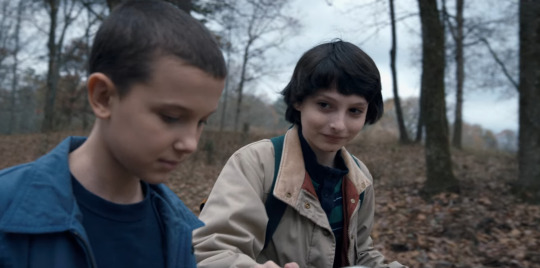
and just look at him. he looks excited. hopeful. a little nervous. but... i want to remind you again: mike has known el for less than 48 hours at this point. this is the first conversation they've had in which they've related to each other as equals. for their entire relationship before this and afterward, outside of their romantic interactions (and also. often. disturbingly. concurrent with their romantic interactions...), mike's role has been as el's protector, a makeshift father figure, the elliot to her E.T. here, though, el tells mike that she understands him.
in season one, mike is twelve years old (read: pre-pubescent). he has no personal understanding of or experience with romance. dustin starts to comment in s1e2, "you're letting a girl...?" and ted later scoffs "our son with a girl?" and outside of the queer coding, what we can take from both of these (which draw back to the original character description) is that mike has no experience with girls whatsoever. (outside of, you know. family. but that's not what this post is about.)
and again, this scene happens almost directly after lucas first introduces the idea of romance between them, both to the narrative, and to mike himself, who, very significantly, up until this point, has shown no romantic interest in el. the sequence of these events is not a coincidence. 1. lucas assumes mike has romantic feelings for el. 2. el and mike have a moment of personal connection and understanding 3. mike "boys only" wheeler puts these two together and assumes the connection between them must be romance. but the expression on mike's face here isn't a representation of already existing romantic feelings. there's no basis for those. again, this moment represents for mike the potential for romance.
which... makes his expression in the van scene hit even harder. because unlike el, will isn't a stranger he barely knows, but rather his best friend of ten years. and it isn't lucas telling mike how mike feels. it's will professing his own feelings about mike, in direct response to mike's self-professed insecurities. (ding ding ding, are your alarm bells going off?) mike's expression at the end of this scene, if we're viewing it as a reprise of his season one expression, is a representation of hope for his romantic future. but this time, heading into the resolution of mike's romantic arc, with all of the knowledge and context we (and mike) have gained over the course of the past four seasons, it's directed at will.
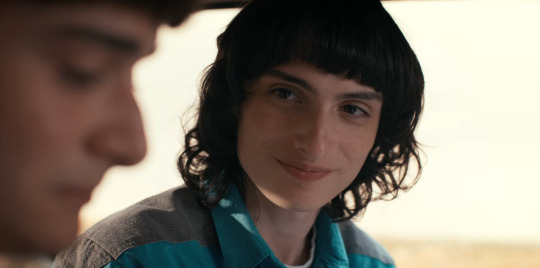
ok. so. with the basic connection between these two scenes established, i'm gonna move a little bit sideways here. at the end of their romantic arc in season one, el disappears from mike's life and will reappears in it, effectively swapping their places (remember that we've been dealing with the mistaken identity trope between these two), and leaving the question of mike's romantic security glaringly unresolved.
and we know why - this is a five act narrative we're watching - but just within the context of the season one arc... the climactic moment of mike finally asking the girl to be his sister kissing the girl was preceded by her locating will in the upside down (leading to his rescue) and followed by a resolution in which she disappeared... and will took her place. at the end of the season, mike is left in the same place he started: playing games in his basement with will, his first attempt to resolve his arc of romantic insecurity, with el, ultimately ending in tragedy.
after season one, this arc picks up again, but this time will is the one present in mike's life. and mike's behaviors toward el in season one, during which they were undergoing a romantic story arc, begin showing up again in his behavior toward will. but unlike with el, mike's particular (read: romantic) behavior toward will happens without outside intervention, and in fact, often in spite of outside intervention. now, this isn't to say that all of mike's behavior with el was a result of others' influence. when el reveals to mike that she is on the run from "bad people," mike is immediately protective and caring toward her. however, as i've already explained, this caring behavior (which, again, we know right off the bat is not romantic because it directly mirrors the way both benny and hopper care for her) doesn't turn into romantic behavior until lucas introduces that idea.
on the opposite side of the spectrum, right from episode one of season one, mike's behavior toward will is fully self motivated, even in the face of opposition.
and as we move through season one and beyond, we can see that mike continues to rely on constant guidance in the way he cares about el (particularly and most consistently from lucas).
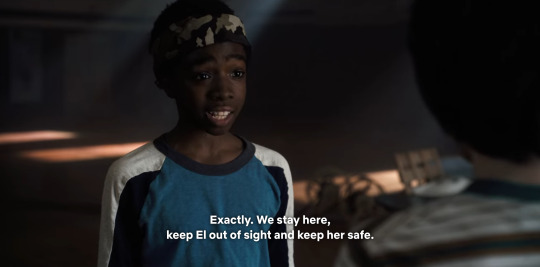


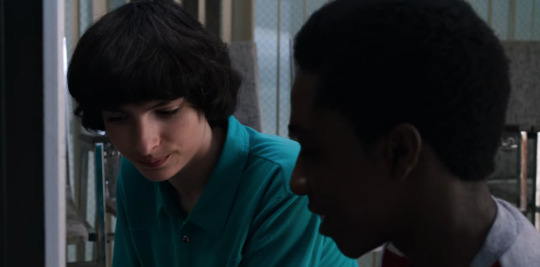
stranger things is, at it's horror filled core, a coming of age tale. like many of our other characters, mike's full character arc, romantic and otherwise, is about self-actualization. from the very conception of the show, his insecurity is presented as a central character flaw to overcome, while also being directly linked with his romantic fulfillment. the overcoming of this fatal flaw, the resolution of his romantic arc, and his final achievement of self-actualization are all inextricably intertwined.
the reprisal of this specific expression of romantic hope as we enter the end of mike's romantic arc is not an indication that mike is in the same place emotionally at the end of season four as he was at the beginning of season one, just with a different person now. instead, it is an indication of his romantic arc coming full circle. mike began in a position of hope for his romantic future with el, only to have the actualization of that hope (their romantic relationship) gradually degrade his romantic fulfillment and self-esteem. the longer mike and el are together, and the more serious their romantic relationship becomes, the worse mike's insecurities become. this is, i would argue, directly related to the fact that mike's pursuit of a romantic relationship with el is not due to his own genuine desire, but instead a combined result of heteronormativity (lucas assuming mike's feelings for el to be romantic), compulsive heterosexuality (mike's subsequent assumption that his feelings for el must be romantic), forced conformity (mike's attempt to resolve his insecurities firmly within these heteronormative boundaries, under the assumption that a rejection of these boundaries is unacceptable), and the trope of mistaken identity that has been following will and el since season one.
and of course i don't know with any concrete certainty what season five will contain, but based on the narrative so far, and optimistically expecting a satisfying resolution to his character arc, the actualization of his romantic hope regarding will is going to lead to true romantic fulfillment and coincide with his self-actualization (a big part of which is coming to terms with his sexuality).
now, i'm not going to conclude this whole analysis by saying, "and that's why mike is gay!" because while i think this all is a good indication of that, based on all of the context and my impression that this narrative is being presented in a way that focuses on the subtext and deeper symbolism of each of these relationships rather than being a case of specifically el vs. will, you might still have a different interpretation than me. that's fine. however, i am going to end by insisting (me when i argue with the wall), based on everything i've laid out, that this parallel and others like it (ie parallels between byler & miIeven's romantic arcs) are not evidence of mike's feelings, specifically whether they are genuinely romantic or not. this parallel serves as a narrative device in his romantic character arc... the conclusion of which is mike realizing and coming to terms with the fact that he is actually in love with will, and not el.
just to be very clear, i'm not saying these parallels alone are proof against mike being bisexual, but i am saying that they are not evidence in support of his being bisexual. again: they do not indicate that mike is romantically attracted to el. what they indicate is that will and el are foils in mike's romantic arc.
before i finish, i want to address a couple misconceptions:
1. the fact that mike actively and willingly participates in a romantic relationship with a woman means he can’t be gay. this is straight up homophobia. gold star bullshit. no.
2. mike and el being presented in a romantic light means that they have genuine romantic feelings for each other. this is a misconception of the way narrative tools are used to tell a story. going right back to my first point: it is an irrefutable fact that many gay people have romantic relationships with the people of different genders (read “the opposite sex”) before they come out/realize their true sexuality. it is also a fact that many of these gay people fully believe their feelings to be genuinely romantic before realizing that they are not. as i've already gone over, mike is twelve years old when his romantic arc begins. on the surface, his relationship with el is presented as romantic. he participates in (and even initiates) romantic behaviors because he believes that his feelings for el are romantic. in seasons one and two, mike is one of our main POV characters. we can see a romantic tilt to the way some of their scenes are shot because, to mike, while they are happening, they are romantic (keeping in mind what i said before about mike having no experience and therefore no personal knowledge informing his perspective, AND keeping in mind that many of these on-the-surface "romantic" scenes are also consistently subtextually linked (read: paralleled) to familial relationships for both of them... and i haven't even touched the cultural context surrounding homosexuality in 80's. there's so much nuance informing the way this story is being told). and we, as the audience, are supposed to read them as romantic on first viewing, because otherwise the season five plot twist, revealing the truth of mike's feelings, would not work.
it is not a coincidence that the active degradation of their romantic relationship (outside of all of the other context, parallels, symbolism, family coding, etc, that are there to hint along the way that things are not as they might seem) begins full force in season three, at the exact point when the two actually enter a real relationship for the first time, and also when our characters are entering puberty, the time during which a person's sexuality (in a general sense, but also in regard to sexual orientation) begins to fully emerge. after his season one arc with el, mike underwent another season-long romantic arc: this time, with will. it's more subtle, because (i believe) mike doesn't realize yet that it's romantic, but it's there. then at the end of season two, mike makes a choice: he encourages will to dance with a girl and he dances with el, re-writing their tragic ending from season one, but now leaving his romantic arc with will frustratingly unresolved, again mirroring the sense of unresolution from season one: mike has swapped out the end of each romantic arc with the wrong love interest.
and then in season three, now having had the experience of both romantic arcs, and now, for the first time, with both will and el right there beside him, all we can see anymore is the overt contrast between the two relationships, depicted most blatantly through the same type of visual and narrative "parallel" we've been looking at here.
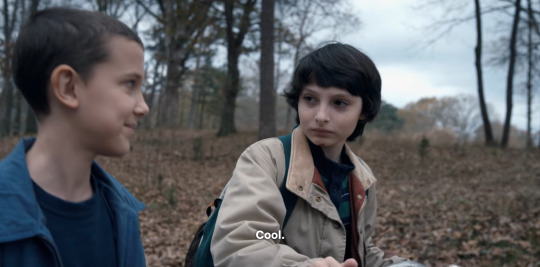
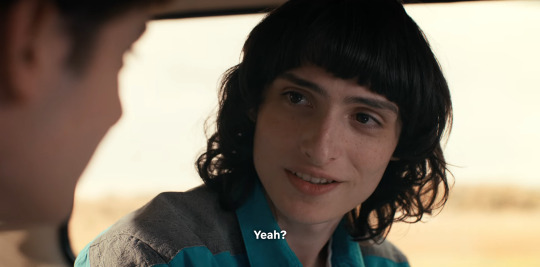
but at the end of this season, instead of making a choice, mike's choice is made for him. he has a romantic moment with will, and then el kisses him, confusing the resolution of these two romantic arcs once again.
mike's season four arc closely mirrors his season one arc (searching for one love interest with the other by his side, mistaken identity trope abound), but with important distinctions: 1. mike is a little older, a lot more experienced, and has a better understanding of both the context of romantic relationships and the scope of his feelings for both el and will. and 2. mike's only real guidance in season four comes from will, and he doesn't simply listen and act based on will's advice, as he did with lucas' in seasons 1&3. now, he fully engages with will's input, pushing back against it when he doesn't agree, and accepting it when he can acknowledge its truth (up until, of course, our fourth (and hopefully final) tragic, incorrectly resolved ending). mike is finally taking control of his romantic narrative in a way he hasn't previously, and the direction it's heading in now is toward security, self-actualization, and will.
so the point of all of this is: nothing is as simple or straightforward as it may seem on the surface. the narrative has always been deeply complex and layered with subtext and symbolism. and most of all, when interpreting the meaning of anything presented directly to us on screen, context matters.
also uh. yeah, mike gay
#byler#mikesbasementbeets posts#parallels are there to be noticed. but that should be where the analysis begins. not where it ends.#this got kinda long i just wanted to be really thorough bc this kind of 'parallel = 1:1 similarity' thinking is way too prevalent#this is less an analysis and more me explaining the plot of the show but. sometimes it feels like it needs to be explained lmao#yes i lied about the ending but when you eliminate the only claim negating that conclusion....#that's. i mean that's the conclusion.#(btw the difference between comparative and experimental investigations is that in an experiment one of the variables is fixed.#something to think about)#mike wheeler
943 notes
·
View notes
Note
could you draw the new vinestaff skin?? :)
Here ya go!

#WOMAN#WOMRN#ME WHEN#ME WHEN WOMAN…….#ANYWAYS#yea when I said “”””small”””” requests I kind of lied to myself I spent 4 and a half hours on this thinf#Anyways i did have a lot of fun doing it though so WORHT IT!!!! :3!#Requests may be very slow for the next few days since i got some comms to finish up!#Shouldn’t take too long though since they’re smaller ones :3!#Anyways I hope you like vinesplash!#artists on tumblr#phighting!#phighting fanart#art#phighting#roblox phighting#phighting roblox#phighting art#digital art#Request#doodle request#vinestaff phighting#vine staff#phighting vinestaff#vine staff phighting#roblox#roblox fanart#not my art#roblox art#phighting! Skin
239 notes
·
View notes
Text



Forgotten or Forgetting?
#lads xavier#xavier#love and deepspace#short comic#hana fanartz#digital drawing#digital art#artwork#恋与深空#Xavier#沈星回#セイヤ#심성훈#Seiya#Shen xinghui#shim seonghun#Im sorry#you can mb forget the last panel#i miss Xavier I swear#we got GOT rerun but Iwant Lumiere#Im f2p so until I get Lumiere i wont pull for anyone else#I have learned well </3#Xavier always mentioned that he forgot a lot of things bcs it was a 'long time ago'#I got a bit of idea from there#what if mc is also forgotten like how she forget him#knowing Xavier he will always assure her but the reassurance is not 100% true#he lied again and again and again#i really wanna hug queen mc#she went through a lot just to went through things over and over again#her love is never confessed nor accepted
31 notes
·
View notes
Text
Joker shouldn’t make a habit of knifing without looking, but he can’t help it. Akechi’s dispassionate expression as he watches himself dissolve into sludge under Ren’s blade is much more interesting than said sludge. Joker wipes off his dagger, sheathes it, and says, “Is it weird watching me kill you?”
“It’s a novelty,” says Akechi.
Another novelty: Ren’s never seen Crow dressed as Akechi before. It’s incredibly odd to watch him hop and flicker between hiding spots looking for all intents and purposes like he’s about to head to school. It’s odder still because the polite smart-casualwear doesn’t at all match the antipathy Akechi’s wearing on his face. Whenever they’d spent time together, Akechi had always worn a pleasantly interested smile; but that pretty face, too, was not what Ren had been pining after.
--
chapter 9 of "as you like it" aka akechi palace au. 11.8k, the long trek to the treasure, the philosophy of taking a heart.
happy fourth birthday to this fic!!! ��
#rookfic#p5#akeshu#aughughfughfugd this was meant to be even longer but it got really stupidly long so i had to chop it in half so now the chapter count.#is higher. i lied last time.#i can't believe this fic is four years old...#i also updated the summary because this fic is four years old#guys ive been so sick and stressed for like a week#it's a miracle this is getting out but i wanted it to get out on its birthday#and also im so fucking sick of sittin g on this chapter ive reread it so many times it isnt words anymore#i tneeds to go. it needs to get a job. it needs to move out#AYLI
75 notes
·
View notes
Note
i’m having illario dellamorte thoughts. what if instead of knowingly betraying lucanis he did it like, unknowingly. idk how this would work but i’m intrigued by what it gives us. illario ‘i accidentally caused my cousin’s death & can never tell anyone’ dellamorte. genuinely grieving. blaming himself. does he take advantage of the year before lucanis comes back?? does caterina still ignore him the whole time?? how different is the canon plotline once rook shows up with lucanis post-rescue…..
anyways i would love your thoughts!!
95% of what i do with illario operates on the idea that he is frighteningly competent so you can see why the way the crows plotline plays out in the game might frustrate me. it’s also this reason why i don’t actually think too much about “illario got lucanis killed, but didn’t mean to do it”, because i like the idea that everything illario does in his life is planned to the second and that he’s too well trained to mess up this badly, if that makes sense. with that being said. 5% of my brain power does sometimes go towards “and what if he just sucked actually” and it was a theory i enjoyed before the game even released. so i have in fact been thinking about this anyway LOL . maybe he tries to honeypot zara, accidentally actually reveals lucanis’ next assassination job, and zara gets rid of him as a ‘gift’. illario is horrified and that gets even worse when lucanis’ body shows up, and he assumes this must be because he spurned zara by leaving her and not having the guts to seize power.
i think we could make his inferiority complex worse. illario’s worst fear confirmed: he is as worthless as his grandmother believes he is, botching something so badly that he accidentally sentences his cousin to death when what he wanted was lucanis just… out of the way for a bit (maybe while he kills caterina. LOL. i still think his resentment of caterina trumps his jealousy for lucanis though those two things are very intertwined its hard for him to differentiate them). so incapable that he got the only person who actually supports him killed, and now he’s dreading the idea of becoming first talon. he doesn’t want first talon without lucanis backing him, and now the only person left is caterina which is suffocating and makes him even unhappier. at least he hadn’t lived through her alone, and now through consequences of his own decisions, illario has no choice but to.
i think that would affect his plans for talon because of how horribly he’d fucked up, and tries to mask it because if he suddenly actually doesn’t want to be talon that would be a red flag for everyone. lucanis coming back would delight him (talon is within his sights again if lucanis comes back!) and freak him out. i think the plotline would actually be pretty similar because of this freak out, so he still shows up to zara’s fight to cover his tracks. lucanis can never know, caterina can never know, because what little faith they have in him will be lost. like he committed fratricide and didn’t even MEAN to😭 ...corpse whispering still happens, and zara is like “ohhh that coward. he can never finish what he started, can he?” + “elaborate.” + “i gave him what he most wanted in the world and instead of being grateful, he ran away.” so lucanis finds out about what happened but feels a mix of “illario, you idiot” + pity because turns out he didn’t even mean for it to happen, and keeps his secret for now, otherwise he’d probably have to kill him.
i also think not meaning to kill lucanis would sour his feelings towards the venatori, who are a reminder of how badly he failed, so the alliance wouldn’t happen. this does mean if the story goes on as it does in canon, he has to take desperate measures another way and kidnap caterina for some other reason but i can’t think of why….. maybe a thing where illario is like “ok. lucanis is distracted by the elven gods. this time i just have to kill nonna for real and then nothing is in my way” and recruits disgraced houses or houses that don’t like caterina to do so? not sure tbh but i don’t believe caterina made it so far without making enemies lol. this would happen post bloodbath + corpse whispering— lucanis leaves his cousin unchecked because while he knows illario didn’t mean for him to die, he has no idea how far he would go to have caterina dead. teia could find out about this and send word to foil the kidnapping and assassination attempt
so ‘murder of crows’ is still about saving caterina, the illario-lucanis fight still happens, but it’s a little more hesitant and lots of “why won’t you just let me kill her? i’m doing this for the both of us”. he’s had to live with being the un-favorite, but never would have thought lucanis would actually pick caterina if it came down to it. with all of his missteps here, i think the final decision (and i think it should be like this in canon anyway) would be to imprison illario or kill him. imprisoning him is just a lot of “i can’t kill illario as much as he couldn’t kill me”, vs killing him as is expected from him as talon, and what he knew he would have to do after finding out about illario's failures. unlike canon, where illario is actually meaning to kill him and can be seen as a 'good crow' despite the sloppiness, here he's like. just bad at everything. the allied traitor houses that went against caterina would also have to be imprisoned or killed. no happy ending at all here, and lucanis still becomes first talon. now that i’ve written it out this is actually probably the worst ending LOL
the above sticks a lot to what is canon to the game (plot points, choices, etc) and i didn’t go very far away from it so it's like canon 3 inches to the left. tho my thoughts on this are not fleshed out* because i think illario works better as an antagonist character that sets things in motion !! not necessarily the villain in a cain-abel story, but a character who opposes lucanis while still not wanting to hurt him. that kind of discipline where he finds a way to get what he wants (first talon) without compromising what he also cares for (family) is so much more fun for me than a man who apparently just loses it and decides to enact a bad plan to get rid of his cousin. if he waited 20+ years to become talon i think he’d be more careful when it came down to it. if i had my way illario would be playing insane 5d chess to rival solas (insert black sails “i once thought that to lead, to be liked was just as good as feared. and that may very well be true. but to be both liked and feared all at once, is an entirely different state of being.”)
#*my thoughts are ‘not fleshed out’ but i still wrote all this. LOL#i nearly answered this ask with the companion-illario au from my mind because i think vg needed a companion that lies to you LOL#but thats less 'illario didnt mean to do it' and more 'oh illario did it and just feels so guilty he goes on a one man crusade#against the venatori because he needs an outlet and both of them are known as magekillers'#he would have lied for most of the game about how lucanis got kidnapped/'killed' and resolves it by saving lucanis + confessing his guilt#this au had elements of 'it was an accident' but i kept flip flopping between if i wanted that or not lol#because . idk. i like when he purposefully does all this and then regrets it. my walking contradiction (slash i want him)#illario guilt inferiority and jealousy you all mean so much to me#but yeah. last point relates to the envyllario rewrite also from my mind#the idea of like. that caution vanishing because of the envy demon is quite fun for me#so spite makes lucanis a victim to his own anger and sense of justice#while envy refuses to let illario maintain his veneer of charm and forces him to act rashly despite his planning#ok. i have to stop talking. thank u anon for this because i am always looking for an excuse to chat shit#prompt me at any point to speak about illario and i honest to god will just be sat here thinking#actually it was pretty bad a few days ago when i was thinking about ways it could go for him in my aus and drawing a blank#and had the very clear thought 'i NEED to put my thinking cap on' which was . a bit humiliating#illario dellamorte#long post#answered#anonymous
40 notes
·
View notes